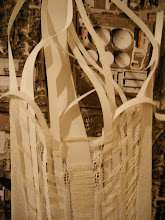(Includes the development histories of:
London (after 1966 fire),
Bath, Stroke on Trent (Industrial England),
Ciudad Guayana (
Venezuela),
Havana “The arguments of planning all come down to the management of change”
“The loss of information increases as the rate of development rises, particularly as our technology now encourages us to make massive alterations of the earths surface for rural as well as urban uses”
PASSAGE OF TIME:
- Rhythmic Repetition: heartbeat, breathing, sleeping and waking, hunger, the cycles of the sun and the moon, the seasons, waves, tides, clocks.
- Progressive and Irreversible change: growth and decay, not recurrence but alteration
Digital clocks display precise time, but they give us little sense of time structure or
Environmental Cues (signals)- should be unobtrusive, and identifiable at significant times of the day. There should be progressive warming of the transformation and to express the general passage of time. (TRANSITIONS AND THRESHOLDS)
“We might prefer to have time signals that, while giving us the information we need to make social coordination possible, also fit natural cycles and our inner sense of time and are clearly suited to our ways of sensing things.” Different observers in different situations have diverse needs for time information, some urgent, some casual.
TIME:
- Grain- size/precision of chunks into which it’s divided
- Period- length of time within which events recur
- Amplitude- degree of change within a cycle
- Rate- speed at which changes occur
- Synchronization- degree in which cycles/changes are in phase or begin/end together
- Regularity- stability/unchanging
- Orientation- degree to which attention is focused on past, present, and future.
- Sequence- order in which they are seen adds to the pleasure of the experience
MANAGING TRANSITIONS:
Change:
- Growth/decay
- Simple redistribution
- Alteration in intensity
- Alteration in form
- Disturbance followed by restoration
- Adaptation to new forces
- Willed change
- Uncontrolled change
“The species of change is so unpleasant and dispiriting that we neglect it as a technical problem” “Environment can teach its users about the nature of change or give them a chance to cause it.”
More often than not, we are adapting rather than changing (responding to outside forces beyond our control. The best environment for human growth is one in which there are both new stimuli and familiar reassurances, the chance to explore and the ability to return. In a mobile world, there must always be a home and a center to return to (reorientation). Managing change requires technique for representing it. —Environment, like institutions and rituals, helps to transform evanescent actions into predictable repetitions.
Public Planning=Adaptive Management (piecemeal response to difficulties as they emerge)

No comments:
Post a Comment